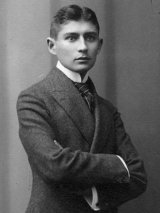Metamorphosis Page #8
The Metamorphosis (German: Die Verwandlung) is a novella written by Franz Kafka which was first published in 1915. One of Kafka's best-known works, The Metamorphosis tells the story of salesman Gregor Samsa who wakes one morning to find himself inexplicably transformed into a huge insect (German ungeheures Ungeziefer, literally "monstrous vermin"), subsequently struggling to adjust to this new condition. The novella has been widely discussed among literary critics, with differing interpretations being offered.
Now Gregor's sister also had to help his mother with the cooking; although that was not so much bother as no-one ate very much. Gregor often heard how one of them would unsuccessfully urge another to eat, and receive no more answer than "no thanks, I've had enough" or something similar. No-one drank very much either. His sister would sometimes ask his father whether he would like a beer, hoping for the chance to go and fetch it herself. When his father then said nothing she would add, so that he would not feel selfish, that she could send the housekeeper for it, but then his father would close the matter with a big, loud "No", and no more would be said. Even before the first day had come to an end, his father had explained to Gregor's mother and sister what their finances and prospects were. Now and then he stood up from the table and took some receipt or document from the little cash box he had saved from his business when it had collapsed five years earlier. Gregor heard how he opened the complicated lock and then closed it again after he had taken the item he wanted. What he heard his father say was some of the first good news that Gregor heard since he had first been incarcerated in his room. He had thought that nothing at all remained from his father's business, at least he had never told him anything different, and Gregor had never asked him about it anyway. Their business misfortune had reduced the family to a state of total despair, and Gregor's only concern at that time had been to arrange things so that they could all forget about it as quickly as possible. So then he started working especially hard, with a fiery vigour that raised him from a junior salesman to a travelling representative almost overnight, bringing with it the chance to earn money in quite different ways. Gregor converted his success at work straight into cash that he could lay on the table at home for the benefit of his astonished and delighted family. They had been good times and they had never come again, at least not with the same splendour, even though Gregor had later earned so much that he was in a position to bear the costs of the whole family, and did bear them. They had even got used to it, both Gregor and the family, they took the money with gratitude and he was glad to provide it, although there was no longer much warm affection given in return. Gregor only remained close to his sister now. Unlike him, she was very fond of music and a gifted and expressive violinist, it was his secret plan to send her to the conservatory next year even though it would cause great expense that would have to be made up for in some other way. During Gregor's short periods in town, conversation with his sister would often turn to the conservatory but it was only ever mentioned as a lovely dream that could never be realised. Their parents did not like to hear this innocent talk, but Gregor thought about it quite hard and decided he would let them know what he planned with a grand announcement of it on Christmas day. That was the sort of totally pointless thing that went through his mind in his present state, pressed upright against the door and listening. There were times when he simply became too tired to continue listening, when his head would fall wearily against the door and he would pull it up again with a start, as even the slightest noise he caused would be heard next door and they would all go silent. "What's that he's doing now", his father would say after a while, clearly having gone over to the door, and only then would the interrupted conversation slowly be taken up again. When explaining things, his father repeated himself several times, partly because it was a long time since he had been occupied with these matters himself and partly because Gregor's mother did not understand everything the first time. From these repeated explanations Gregor learned, to his pleasure, that despite all their misfortunes there was still some money available from the old days. It was not a lot, but it had not been touched in the meantime and some interest had accumulated. Besides that, they had not been using up all the money that Gregor had been bringing home every month, keeping only a little for himself, so that that, too, had been accumulating. Behind the door, Gregor nodded with enthusiasm in his pleasure at this unexpected thrift and caution. He could actually have used this surplus money to reduce his father's debt to his boss, and the day when he could have freed himself from that job would have come much closer, but now it was certainly better the way his father had done things. This money, however, was certainly not enough to enable the family to live off the interest; it was enough to maintain them for, perhaps, one or two years, no more. That's to say, it was money that should not really be touched but set aside for emergencies; money to live on had to be earned. His father was healthy but old, and lacking in self confidence. During the five years that he had not been working - the first holiday in a life that had been full of strain and no success - he had put on a lot of weight and become very slow and clumsy. Would Gregor's elderly mother now have to go and earn money? She suffered from asthma and it was a strain for her just to move about the home, every other day would be spent struggling for breath on the sofa by the open window. Would his sister have to go and earn money? She was still a child of seventeen, her life up till then had been very enviable, consisting of wearing nice clothes, sleeping late, helping out in the business, joining in with a few modest pleasures and most of all playing the violin. Whenever they began to talk of the need to earn money, Gregor would always first let go of the door and then throw himself onto the cool, leather sofa next to it, as he became quite hot with shame and regret. He would often lie there the whole night through, not sleeping a wink but scratching at the leather for hours on end. Or he might go to all the effort of pushing a chair to the window, climbing up onto the sill and, propped up in the chair, leaning on the window to stare out of it. He had used to feel a great sense of freedom from doing this, but doing it now was obviously something more remembered than experienced, as what he actually saw in this way was becoming less distinct every day, even things that were quite near; he had used to curse the ever-present view of the hospital across the street, but now he could not see it at all, and if he had not known that he lived in Charlottenstrasse, which was a quiet street despite being in the middle of the city, he could have thought that he was looking out the window at a barren waste where the grey sky and the grey earth mingled inseparably. His observant sister only needed to notice the chair twice before she would always push it back to its exact position by the window after she had tidied up the room, and even left the inner pane of the window open from then on.
Translation
Translate and read this book in other languages:
Select another language:
- - Select -
- 简体中文 (Chinese - Simplified)
- 繁體中文 (Chinese - Traditional)
- Español (Spanish)
- Esperanto (Esperanto)
- 日本語 (Japanese)
- Português (Portuguese)
- Deutsch (German)
- العربية (Arabic)
- Français (French)
- Русский (Russian)
- ಕನ್ನಡ (Kannada)
- 한국어 (Korean)
- עברית (Hebrew)
- Gaeilge (Irish)
- Українська (Ukrainian)
- اردو (Urdu)
- Magyar (Hungarian)
- मानक हिन्दी (Hindi)
- Indonesia (Indonesian)
- Italiano (Italian)
- தமிழ் (Tamil)
- Türkçe (Turkish)
- తెలుగు (Telugu)
- ภาษาไทย (Thai)
- Tiếng Việt (Vietnamese)
- Čeština (Czech)
- Polski (Polish)
- Bahasa Indonesia (Indonesian)
- Românește (Romanian)
- Nederlands (Dutch)
- Ελληνικά (Greek)
- Latinum (Latin)
- Svenska (Swedish)
- Dansk (Danish)
- Suomi (Finnish)
- فارسی (Persian)
- ייִדיש (Yiddish)
- հայերեն (Armenian)
- Norsk (Norwegian)
- English (English)
Citation
Use the citation below to add this book to your bibliography:
Style:MLAChicagoAPA
"Metamorphosis Books." Literature.com. STANDS4 LLC, 2025. Web. 5 Feb. 2025. <https://www.literature.com/book/metamorphosis_20>.








Discuss this Metamorphosis book with the community:
Report Comment
We're doing our best to make sure our content is useful, accurate and safe.
If by any chance you spot an inappropriate comment while navigating through our website please use this form to let us know, and we'll take care of it shortly.
Attachment
You need to be logged in to favorite.
Log In